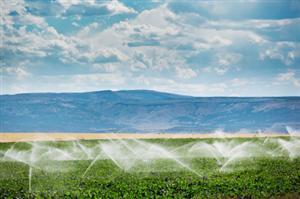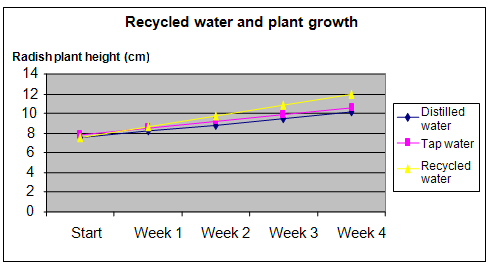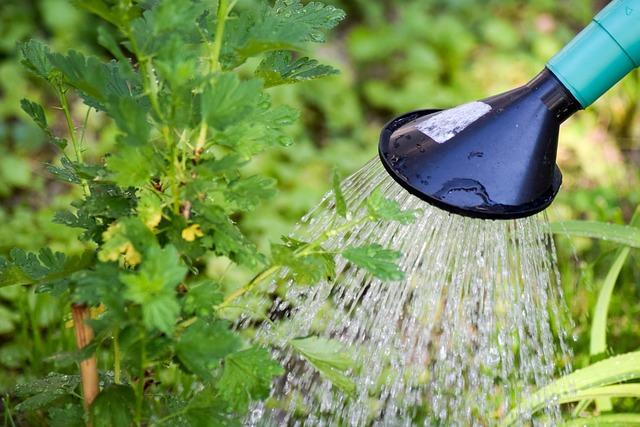| Complexity level: | 8 |
| Project cost ($): | 20 |
| Time required: | 1 day to prepare, 28 days for the science project experiment |
| Material availability: | You will need access to a source of recycled water. |
| Safety concerns: | Basic safety requirements |
Hypothesis
Radish plants will grow more quickly when watered with recycled water.
Overview
Recycled water
Recycled water is basically sewage water that has been treated to remove some of the impurities and solids. Examples are water that is washed down the kitchen sink, flushed down the toilet and water that is used for laundry. Usually, recycled water is used only for irrigation or fire fighting as it is unsuitable for human consumption without being further treated/processed.
The cost of recycled water is normally higher as compared to the cost of acquiring fresh water, in countries where fresh water resources are readily available. However, recycled water is normally sold at a cheaper price to encourage usage, in order to help conserve fresh water resources. Recycled water is also rich in nutrients like nitrogen and phosphorus making it very suitable for use in agriculture and horticulture.

There are some concerns regarding the safety of recycled water and public health. The presence of some pathogens that cannot be destroyed by chlorine, and the possibilities of infecting people as this water is sprayed across lawns or farmland through sprinklers, is cause for concern. Another cause for concern is the seepage of impurities from the recycled water into ground water resources.
Scientific Terms
Materials
The materials required for this science fair project:
- 15 potted radish plants of almost the same height
- distilled water
- tap water
- recycled water
- a ruler
- a black marker pen
Procedure
1. For this science fair project, the independent variable is the type of water used to water the plants – distilled water, tap water and recycled water. The dependent variable is the height of the radish plants. This is determined by measuring the height of the radish plant every week. The constants (control variables) are the size of the pot, the original size of the plant, the type of plant, the amount of water given to each plant and the amount of sunlight received.
2. Fifteen radish plants are separated into 3 groups of 5 pots each. The average height of the plants is obtained by totaling the height of the plants in each group and dividing by 5. The average height is calculated and recorded in the table below.
3. The pots in each group are labeled as “distilled”, “tap” and “recycled” using the black marker pen in order to differentiate between the 3 groups.
4. The 15 pots are placed in a location where they are able to receive the same amount of sunlight. They are watered once a day with the same amount of water. The group of pots labeled “distilled” is watered with distilled water only. The pots labeled “tap” are watered with tap water only and the pots labeled “recycled” are watered with recycled water only.
5. The height of the plants is measured once every week for the next 4 weeks. The average height for each group of plants is obtained by totaling the height and dividing by 5. The calculated average is recorded in the table given below.


Results
The results showed that plants that were watered with recycled water grew more quickly than the other plants, during the 4 weeks of observation.
|
Water used |
Growth rate of radish plants cm) |
||||
|
Start |
Week 1 |
Week 2 |
Week 3 |
Week 4 |
|
|
Distilled water |
7.5 |
8.2 |
8.8 |
9.5 |
10.1 |
|
Tap water |
7.8 |
8.5 |
9.2 |
9.9 |
10.6 |
|
Recycled water |
7.6 |
8.7 |
9.7 |
10.8 |
11.9 |
The graph below represents the results of our science project experiment.

Conclusion
The hypothesis that radish plants grow more quickly when watered with recycled water is proven to be true.
Recycled water can be used for many applications and helps to conserve our fresh water resources. It can be used in industrial processes, irrigation, watering public parks and gardening. In some countries like Singapore and in Orange County, California, recycled water is given a more advanced treatment and used as drinking water.
Also consider
Try to repeat the science fair project using different types of plants. Observe if these plants react similarly to the radish.
The science project experiments can also be repeated to compare the rate of seed germination when recycled water is used.
References
Reclaimed water - http://en.wikipedia.org/wiki/Reclaimed_water
What is recycled water? - http://www.waterrecycling.net.au/content/what_is.asp

